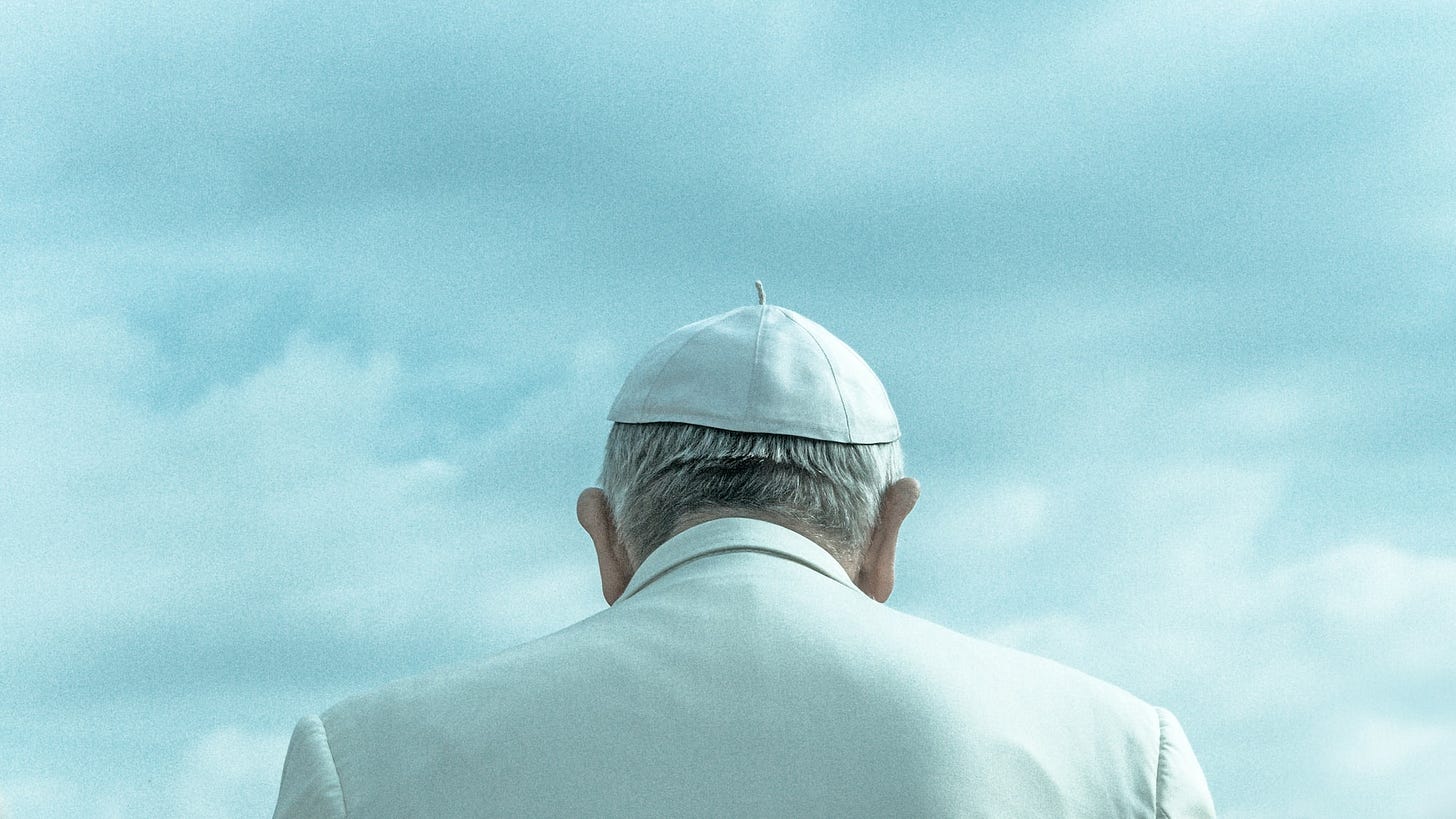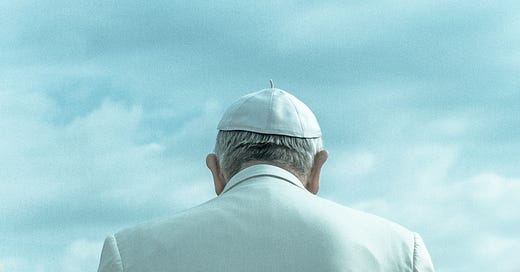
‘Pope Francis unleashed’ vs the ‘conservative plot’ — are either real?
Many are claiming the death of Benedict will mark a new era for Pope Francis, and predicting a conservative backlash. Is either true?

After the death of Pope Benedict XVI on New Year’s Eve, some figures around the Vatican predicted that the death of the pope emeritus would usher in a “new era” of the Francis pontificate, unrestrained by his predecessor.
And even before Benedict’s funeral, some Church-watchers have also claimed there is a kind of renewed resistance to Pope Francis among his “conservative” critics, with talk even of plots to force the pope from office.
Are either of those narratives real?
Is the death of Benedict really likely to affect Francis’ governance of the Church? How real is the talk of a brewing ecclesiastical civil war in Rome? Or are both narratives actually signs of growing impatience among progressive Catholics with a pope who, some say, has not gone “far enough” in the first decade of his reign?
📰
—
The death of Pope Benedict on Dec. 31 had the unusual character of feeling both sudden and expected for many in the Church, and especially in Rome. In the near decade he spent living in his self-created status of “pope emeritus” he grew steadily less visible, and his public statements (never frequent) ever fewer.
While some of his rare contributions to Church life, like his 2019 letter on episcopal accountability in the wake of the McCarrick scandal, were warmly welcomed by all sides, others were not.
Most notably in 2020, when a book in defense of clerical celibacy appeared listing Benedict as a co-author with Cardinal Robert Sarah, many prominent “pro-Francis” commentators denounced it as an attempt by the former pope (and his supporters) to block his successor’s freedom to reform the Church as he saw fit.
That criticism was renewed when Pope Francis declined to loosen the discipline of celibacy after the Synod on the Amazon, and fed into a wider narrative that the pope could, or would, have been bolder on a range of issues — from married clergy to same sex unions, to female ordination — had it not been for the restraining force of his nonagenarian predecessor living in semi seclusion at the bottom of the garden.
Francis did, of course, visit Benedict at the Mater ecclesia monastery, and there is no record of what the two men might have discussed in private, and no definitive way of knowing how much the former pope influenced or even restrained Francis. But the suggestion, often made in the wake of Benedict’s death, that the pope emeritus was some kind of check on a radical Francis pontificate doesn’t have many obvious examples to draw on.
The controversial book on clerical celibacy, from which Benedict’s name was subsequently removed as a co-author, didn’t depart markedly from Francis’ own numerous public statements in support of the discipline.
Similarly, expectations of definitive change on issues like female ordination and Church recognition of same-sex unions have been repeatedly stoked and disappointed during the Francis era, with the pope himself often making his own reservations on the subjects clear.
And on signature Benedict issues, like the use of the extraordinary form of the liturgy, the pope emeritus did not seem willing or able to prevent Francis effectively abrogating his predecessor's legacy.
Indeed, in the days following Benedict’s death, his former private secretary Archbishop Georg Gänswein published a book “revealing” what many already assumed: that Benedict was “heartbroken” over Francis’ promulgation of Traditionis custodes in 2021. Yet the book, billed as a controversial tell-all, offered no indication Benedict offered or encouraged any resistance to Francis’ decision, and instead accepted it as the will of the pope.
Despite this, the narrative that “Francis could have achieved more without Benedict” has gained traction in many corners of the Church, perhaps especially in the former pope’s native Germany, where many of the more radical and unfulfilled proposals for reform have formed the core of the “synodal way” which Francis has repeatedly sought to check.
And it is probably worth noting that, when Benedict was alive but out of Church affairs, Francis was denounced for lacking the “courage” to produce “real reform” by the synodal organizers, without reference to his predecessor.
In fact, dispassionate weighing of Francis’ words and actions on issues like female ordination, married clergy, and homosexuality probably supports the 2019 conclusion of Vatican commentator Austen Ivereigh, who said Benedict and Francis were “very different men, and very different popes. But on the fundamentals, there seems to be little distance between them."
While few of the most prominent self-styled champions of Francis may agree with that conclusion today, the narrative that Benedict was some kind of (unwelcome and illicit) restraining force on Francis may be a kind of deflected criticism of the current pope, and an expression of frustration that he hasn’t gone further with a reforming agenda for which he’s cleared much space, but offered little practical support.
—
Shortly after Benedict’s funeral, and amplified by the publication of Gänswien’s book, media reports and commentary pieces also began circulating about a supposed “secret plan” among conservatives to drive Pope Francis from office.
These reports, which made their way into secular media coverage, offered up sometimes lurid conspiracy theories which ran the gamut from plots to heap pressure on Francis to force his resignation to a supposed “secret conclave” held by cardinals who rejected Francis’ election and considered the see of Peter vacant after Benedict’s death.
While talk of secret benevacantist conclaves is obvious fantasy, criticism of Francis’ pontificate certainly does exist in the Church. Many — including bishops and cardinals — have spoken publicly about their concerns with the methods and aims of the ongoing global synodal process. But is there really any evidence that it has become elevated in recent weeks, or that it is part of a “conservative plot” to unseat the pope following Benedict's death?
Shortly following his own death, 10 days after Benedict, Cardinal Pell was credited with the authorship of last year’s so-called Demos memo, a stark critique of the Francis pontificate ranging across issues from the synod, to clarity on Church teaching, to Vatican financial reform.
The memo’s publisher, Vatican journalist Sandro Magister, has said Pell gave permission to identify him as the author after his death. As it happened, Magister’s announcement to that effect coincided with an article written by Pell for a British magazine, which repeated criticisms of the synodal process.
The posthumous airing of Pell’s criticisms has made news. And, in the case of the Demos memo, it has led to a sharp conversation about what Pell believed the next pope ought to do, whenever he arrives. But the Demos memo was first circulated nearly a year ago, and timing of Pell being outed as the author was apparently linked to his own death, not Benedict’s (barring even more lurid conspiracy theories), and so hardly creditable to a current plot against Pope Francis.
More to the point, many of Pell’s concerns about the wider “synodal agenda” have been echoed for some time by others, including prominent liberal voices, like Cardinal Walter Kasper.
Similarly, in press comments ahead of a forthcoming book, former CDF prefect Cardinal Gerhard Müller has warned against the “contradictory paradigm” being employed in the synodal process to challenge Church teaching, but has pitched his criticisms as a “help [to] people who have problems with this pontificate,” rather than as direct opposition to Francis himself.
In all cases, the concerns expressed by figures like Pell, Kasper, and Müller long predate the death of Benedict and coverage of them is almost always framed in opposition to Francis’ supposed support for an agenda including married clergy, openness to female ordination, and acceptance by the Church of homosexual relationships.
Rather than a new “civil war” in the Vatican, it appears very much like business as usual during a pontificate in which Francis has routinely said he wants open discussion of contentious issues.
Ahead of the final stage of the global synodal process set to begin in Rome in October, those same contentious issues will, no doubt, be subject to the same kind of feverish debate and expectation building which have preceded previous synodal sessions. But as of yet Francis has given no indication he will deliver the kind of dramatic reforms being called for in some wings of the Church, even if he seems willing to allow them to shape the meetings’ agenda.
If those radical reforms do not arrive, it seems likely that those disappointed by Francis’ failure to deliver on that agenda will blame “conservatives” for holding the pope back.
Will that blame be fairly placed?
Given Francis’ reputation as a hard, if not impossible man to manage, it seems more likely that it is the pope himself, and not some “vast right-wing conspiracy,” who will decide what he does with the rest of his papacy, and what he doesn’t.




